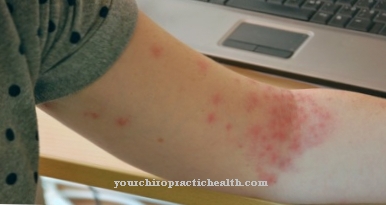From sexual aversion both sexes can be affected. With increasing age, the risk of not having any desire for sexuality increases; statistically, women over the age of 45 are more often affected.
What is sexual aversion?

Lack of sexual desire or a permanent lack of sexual desire are common in industrialized societies. Sexologists also assume that there is a large number of unreported cases, because many people shy away from going to the doctor out of misunderstood shame.
Consistent research into the cause can often initiate a solution to the problem. Frustration can set in over time, because those affected often come to terms with their condition, although they long for love, affection and tenderness inside. Loss of libido is the most commonly diagnosed sexual disorder in the western world.
The sexual desire can come to a complete standstill. Erotic thoughts or fantasies also decrease. If the person concerned is in a couple relationship, the symptom of sexual aversion or frigidity can quickly become a stress test. Without sex therapy, relationships break up frequently.
causes
A sexual aversion always affects the whole person in his body-mind-soul unity. Doctors are also increasingly taking a holistic approach to researching the cause. Searching for the causes of a loss of libido is often like detective work.
Psychological, but also serious physical causes are possible. Asexuality as a congenital sexual disorder only plays a subordinate role. These people have no desire for sexuality or physical closeness. In the vast majority of cases of sexual aversion, it is the symptom of other diseases or side effects of medication. Serious physical illnesses such as diabetes or cancer quite often lead to sexual disorders over time.
All hormonal diseases also quickly lead to an imbalance in sex hormones and, as a result, to sexual aversion. In particular, thyroid dysfunction in the sense of hypofunction can cause libido or potency disorders. Other common medical causes of sexual aversion are dialysis, low testosterone levels in men, anxiety disorders and depression.
Diseases with this symptom
- frigidity
- Menopause
- Renal failure
- Endometriosis
- heatstroke
- Heart failure
- Anxiety disorder
- Hypogonadism
- Erectile impotence
- Hypothyroidism
- Hormonal imbalances
- Diabetes mellitus
Diagnosis & course
For an exact diagnosis of sexual disorders, which also include sexual aversion, interdisciplinary cooperation between various specialist disciplines is usually required. General practitioners, gynecologists, urologists and psychotherapists can then work closely together to make the diagnosis and create a therapy concept that should always be strictly based on the individual cause.
The diagnostic procedures for sexual disorders that have been tried and tested in Germany have already been successfully used in the USA. The first diagnostic step is always an in-depth questioning of the individual or a couple about the current situation. The experienced sexologist can draw valuable diagnostic conclusions from the anamnesis alone and coordinate the further procedure accordingly.
For women, the so-called Female Sexual Function Index is the standard for the survey. This standardized questionnaire enables the doctor to accurately assess or fluctuate sexual desire over a defined period of time. Thorough physical examinations of the primary and secondary genital organs follow. If sexual aversion or loss of libido is not treated, the sexual disorder tends to become chronic. Over time, therapy becomes more and more complex and difficult.
Complications
Complications that can arise from sexual aversion are primarily of a psychological nature. In a relationship in particular, the person concerned often experiences a great deal of suffering. This is not least triggered by the impaired sex life with the partner. To do this, the partner does not necessarily have to react with incomprehension.
Many patients who suffer from sexual aversion judge themselves and feel guilty towards their partner. The consequences are often irritability, suppressed aggression and frustration. If the relationship partner also reacts with accusations, arguments and a split in the relationship are inevitable.
Even with treatment, a potential complication is that the person cannot relax and is afraid of relapse. Escaping this vicious circle is difficult without psychological support. In addition, there may be other complications that can be traced back to the underlying disease. The causes are often associated with exhaustion and tiredness, which in the worst case can develop into depression.
Also, painful intercourse can be another problem. To prevent this, it is important to talk to your partner and a doctor about the problems. Honesty and transparency come first to prevent complications. Not infrequently, these significantly reduce the joy of life.
When should you go to the doctor?
Sexual aversion can have various causes such as stress or hormonal changes and usually regulates itself again. A doctor should be consulted if the loss of libido becomes a burden or the partnership suffers. Medical advice is also required in the case of persistent complaints, which may even be associated with accompanying physical symptoms.
The same applies if the sexual aversion is related to depression or if there are social causes such as work or family stress. If you lose your libido after a traumatic experience, we recommend talking to your gynecologist or seeking therapeutic advice. Sexual aversion after taking medication should be discussed with the doctor.
Most of the time, the libido increases again as soon as you switch to another preparation. Alcoholic people, diabetics and patients with a neurological disorder should clarify disorders of the libido immediately, as this may be an accompanying symptom of the underlying disease. If the cause is unknown, sexual activity can be observed first. If there is no improvement after a few weeks, medical measures should be taken.
Doctors & therapists in your area
Treatment & Therapy
The treatment of libido, potency or sexual disorders should consistently be cause-related. If the cause of a sexual displeasure is to be found in the physical area, then the underlying disease must first be treated. Only then can sex therapy take place as conversation sessions or as couple counseling. If the cause is years of taking birth control pills, stopping them can already lead to sexual displeasure disappearing again.
As a substitute, the gynecologist can also prescribe weakly dosed male sex hormones and thus often achieve amazing results. A hormone analysis of the blood can also be useful in men; if the testosterone level is low, the missing hormone can also be substituted in this case. Unfortunately, men naturally suffer from a relative testosterone deficiency with increasing age, which can not only lead to a loss of libido but also to erectile dysfunction. Disorders of the blood circulation, the sensitivity or the hormone balance as the cause of libido disorders can now be treated well with drug therapies.
Partnership or psychological problems should be treated by trained sex therapists in so-called revealing sessions. Successful treatment of sexual disorders can also be seen in the fact that general listlessness, lack of drive or tiredness disappear.
Outlook & forecast
Sexual aversion can have physical or emotional triggers. Most of the time, a physical reason for sexual aversion can be resolved more quickly and easily. In women who take hormonal contraceptives, the lack of libido may already be the reason. A change of contraceptive allows sexual desire to return. Other drugs can have similar effects - on both sexes. If the triggering drug can be discontinued, it can take days to weeks for sexual desire to return. A hormonal imbalance is also conceivable.
Since the treatment of such triggers already takes a few weeks, it should be expected that the libido will only return to normal afterwards. The prerequisite is that hormone replacement therapy or another form of treatment is able to bring the patient's hormone balance back into balance.
If, on the other hand, there are psychological triggers in the room, it often takes longer for the sexual unpleasure to improve. Problems in the partnership, fears due to pain during sex or a surviving childbirth, fears of an unwanted pregnancy or unpleasant sexual experiences in the past are not easy to come to terms with and therefore often require several months of therapy.How long it takes to wait for treatment to be successful also depends on the severity of the emotional injury suffered by the patient concerned.
prevention
In order to prevent sexual displeasure due to psychosomatic causes, a precise analysis of lifestyle or partnership is necessary. Conflicts should be addressed and resolved at an early stage. Exercise and a work-life balance ensure a balanced hormonal balance, i.e. a good balance between the demands of work and leisure. Negative stress, drug abuse and obesity are to be avoided because these can prepare the ground for sexual disorders to develop.
You can do that yourself
A libido disorder usually has more than one cause. Affected people who suffer from their sexual aversion should definitely consult a doctor to clarify possible physical causes. Furthermore, those affected should avoid all factors that are often not solely responsible for the lack of libido, but regularly contribute to listlessness. Insufficient sleep, constant work stress, cigarettes and excessive alcohol consumption are all counterproductive. A healthy diet and sufficient physical activity improve your general well-being and thus also have a positive effect on your libido.
If listlessness goes hand in hand with tiredness and general exhaustion, there may be a lack of nutrients. Very often the iron level is too low. Those affected can then integrate iron-rich foods into their diet or switch to dietary supplements. In severe cases, treatment by a doctor is required.
In women, sexual aversion is normal months after having a child and is not a cause for concern. Women who use hormonal contraception and who suffer from long-term sexual aversion should temporarily switch to another method of contraception and monitor their libido development during this time.
In naturopathy, “detoxification cures” are often advised in cases of sexual aversion in order to improve general well-being and to rekindle the libido. Relaxation techniques such as yoga or autogenic training should also be helpful.



























